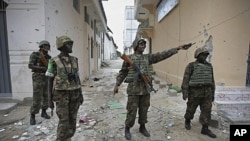The U.N.'s top diplomat for Somalia said Wednesday that there are significant improvements in the security situation in Mogadishu after the surprise withdrawal on Saturday by al-Shabab insurgents from the city. Augustine Mahiga said the fighters have been weakened by national and African Union forces, and that they have split up as they pull back from the Somali capital.
Ambassador Mahiga told reporters via a teleconference from Mogadishu that al-Shabab's so-called tactical retreat has fragmented the fighters into three groups.
"One column going southwards, another going westwards, and another going northwards - and they are still on the move," said Mahiga. "This already weakens their consolidated strength."
Mahiga said the Islamist militants are also being starved of financial support from individual benefactors, mainly in the Middle East and Arabian Gulf region. They also have lost vital revenue from the Bakaara market, which is the economic hub of the capital and had been under the insurgent's control until last week.
The U.N. envoy also credited Security Council sanctions targeting al-Shabab for taking a toll on their military and economic strength.
Mahiga said the territorial gains by the Transitional Federal Government forces, with support from African Union troops, known as AMISOM, translate to about 95 percent of the capital no longer in insurgent hands.
Earlier Wednesday, Mahiga briefed the U.N. Security Council via teleconference, saying that the improved security situation means the United Nations will be able to expand its presence in the country sooner than expected.
"We originally had anticipated that Mogadishu would be stabilized within roughly a year, but we are now revising our planning to focus on the immediate," added Mahiga. "We are now actively planning for an expanded U.N. presence inside Somalia, rather than a 'light footprint' we had envisaged."
Mahiga told journalists that by year's end he hopes to have 24 staff members in Mogadishu and expanded staffs in Puntland and Somaliland. Mahiga has asked the Security Council to authorize a force of 300 troops to guard U.N. personnel and other agencies in the capital.
Next month, on the margins of the U.N. General Assembly annual debate, U.N. Secretary-General Ban Ki-moon is expected to convene a ministerial meeting on Somalia's political situation. Mahiga said Britain, Italy and Uganda requested the high-level meeting.
Although Somalia's security situation might be at a positive turning point, the humanitarian situation in Somalia is becoming more dire.
The U.N.'s Deputy Humanitarian chief Catherine Bragg told the Security Council that 3.7 million Somalis are in crisis due to the severe drought and famine. She said children are in particular need, with more than 1.25 million children across southern Somalia in urgent need of life-saving assistance.
UN: Al-Shabab Weakened, Fragmented




